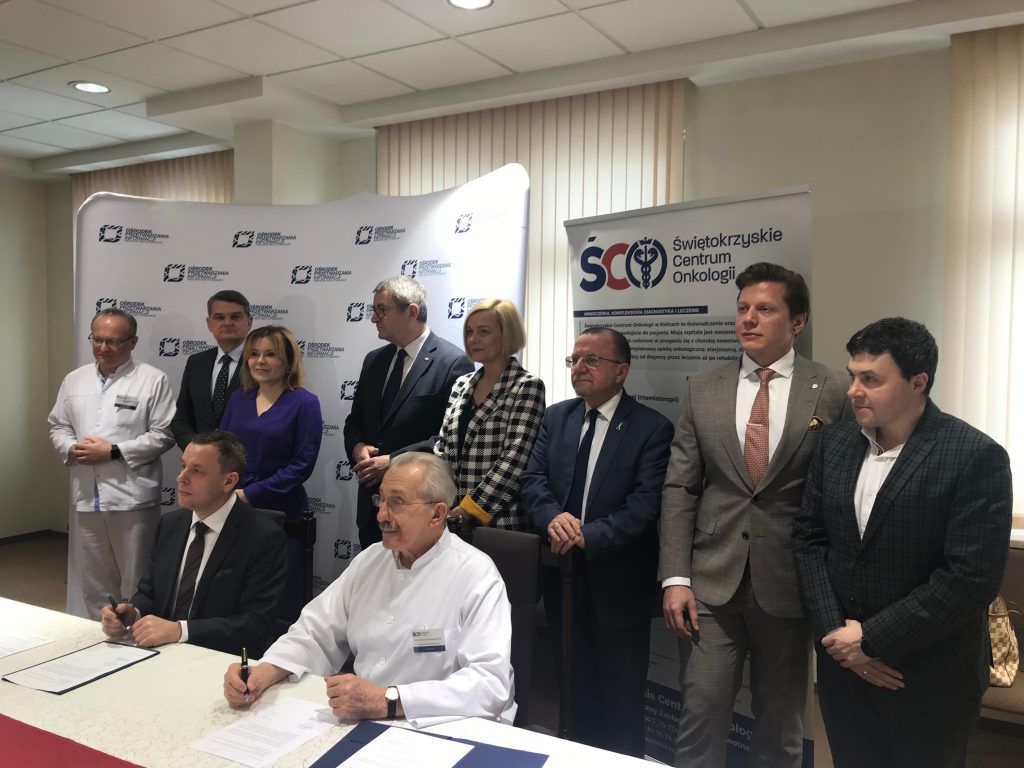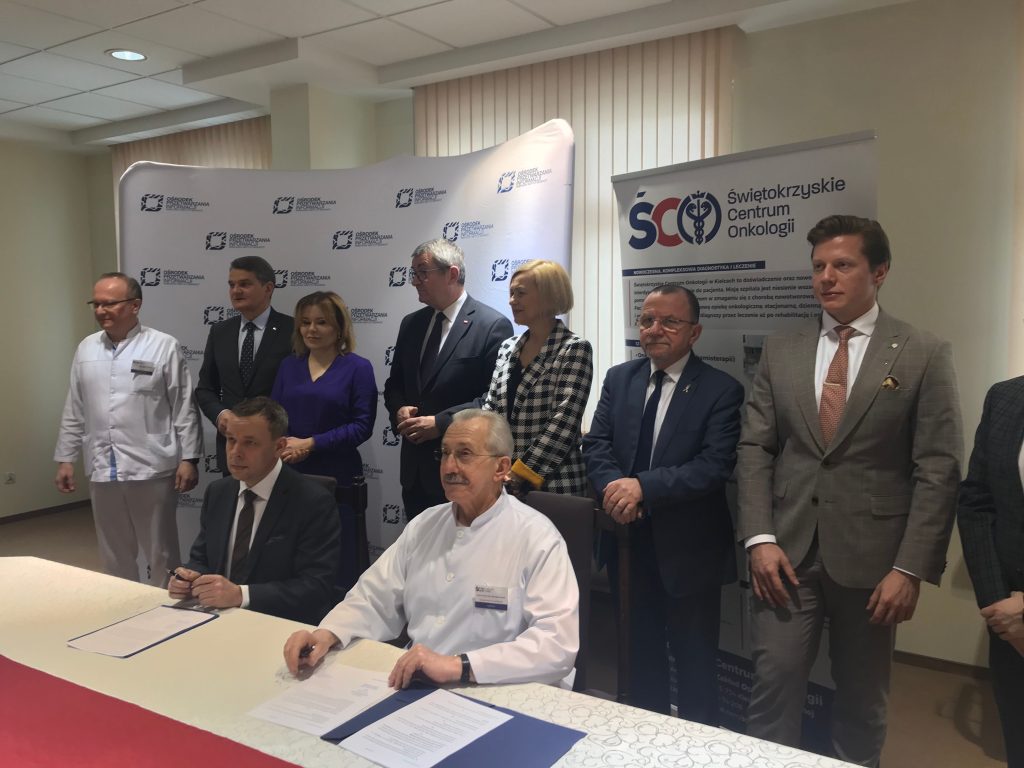On 6 March, 2023, the National Information Processing Institute (OPI) and the Holy Cross Cancer Center (ŚCO) in Kielce signed an agreement on joint scholarly projects. The collaboration between the organisations will focus on oncology diagnostics. The persistent shortage of diagnosticians in Poland is impeding the prompt and effective delivery of therapies. In response, the use of artificial intelligence (AI) in diagnostics has become increasingly popular at medical centres worldwide, including those in Poland. For many years, OPI has been a developer of IT tools that are utilised widely in medicine. The agreement between OPI and ŚCO paves the way for the development of innovative projects that will benefit both institutions and the patients of ŚCO.
The agreement will support the Polish scholarly community through the implementation of a new project, which involves the creation of a fully-annotated, open-source set of digital histopathology images of the prostate. The set will be used as an open-source reference set for future Polish research and will enable the development of optimal AI methods in the analysis of histopathological imaging. By implementing this solution, the stage of a cancer can be assessed automatically, providing invaluable support to diagnosticians.
‘OPI, a renowned scientific centre with immense research potential, has made an agreement with ŚCO in Kielce. The expertise of AI specialists at OPI will be synergised with the knowledge of doctors and physicists at ŚCO. Working in collaboration, they will develop innovative initiatives that enhance oncology diagnostics through the use of state-of-the-art computer technologies,’ says Wojciech Murdzek, Secretary of State at the Polish Ministry of Education and Science. ‘I sincerely hope that the two partners will submit an application to obtain a subsidy for their research teams who collaborate as part of the Virtual Research Institute (WIB). As the WIB funds are designated for oncology, I am confident that this project will receive the necessary support to enhance cancer prevention efforts,’ adds Mr Murdzek.
To promote the importance of preventative health screenings, Mr Murdzek underwent a blood test that enables early detection of prostate cancer—currently one of the most common types of malignant tumour among men. Prostate cancer poses a significant health risk, particularly for older men. However, early detection can lead to successful treatment. Prioritising regular check-ups and ensuring prompt and accurate diagnosis ultimately increases patients’ chances of survival.
‘I am very pleased that we have established a collaboration with ŚCO. I am confident that by working together, we can achieve numerous research initiatives that will not only benefit our organisations, but also local communities,’ says Dr Jarosław Protasiewicz, Head of OPI. ‘Artificial intelligence is becoming increasingly prevalent in medicine. The Polish scientific community is also placing greater emphasis on incorporating AI into their research endeavours, which is confirmed by the OPI report, Artificial Intelligence and the Science and Higher Education Sector: A review of strategic documents and achievements in the world. The report can be accessed through OPI’s RAD-on portal,’ adds Dr Protasiewicz.
Under the agreement signed in Kielce, both parties have pledged to engage in scientific research and to execute research and development projects that concentrate on producing reference datasets. They will contain comprehensive histopathological, radiological, and clinical data that will be used to develop diagnostic support methods and, more importantly, to train AI algorithms. Poland lacks reliable datasets, which are crucial for ensuring the accuracy of algorithms. AI tools are only as effective as the quality of the data used to train them.
The agreement includes provisions for the collaborative development of diagnostic scenarios that establish and utilise indicators to assess the quality and credibility of solutions that rely on diverse AI methods. Collaborative efforts aim to identify the most effective methods of supporting diagnostics, while considering their efficacy, explicability, and diagnostic value. Moreover, OPI and ŚCO have reached a decision regarding collaborative publications in reputable scientific journals. They will also seek funding for joint projects as part of a WIB competition for the selection of the best research teams. The competition is organised periodically by the Łukasiewicz Research Network – PORT Polish Center for Technology Development.
AI has become a crucial tool in medical science; one that has revolutionised the way we diagnose and treat a wide range of illnesses. Poland has been compelled to adopt the use of AI in medicine due to a shortage of specialised doctors in the country. OPI has been at the forefront of utilising AI in the medical field for several years. One of the most notable examples is the institute’s implementation of the AI-enhanced radiology – detection, reporting and clinical decision-making in prostate cancer diagnosis project, which is financed as part of the INFOSTRATEG I competition organised by the National Centre for Research and Development (NCBR). The project’s main goal is to create a system that reports prostate cancer mpMRI scans; one that is developed on the basis of integration of standardised structural reports and trained machine learning methods that analyse the scans—a highly innovative concept. The results of the image analyses will be used to support radiologists in various aspects of their work. This will shorten the time needed to identify prostate lesions and reduce the number of painful biopsies. The knowledge and experience acquired during the project will be invaluable for future research conducted in collaboration with the clinicians at ŚCO.
‘Experts at OPI are dedicated to advancing the use of the latest IT innovations in medicine and healthcare. The Laboratory of Applied Artificial Intelligence has developed eRADS, a research platform that standardises medical report descriptions. OPI’s research on the use of deep learning to support imaging diagnostics demonstrates that AI could greatly improve the efficiency of medical professionals. The results are very promising,’ says Dr Piotr Sobecki, Head of the Laboratory of Applied Artificial Intelligence at OPI, which is responsible for the collaboration with ŚCO. ‘AI’s development and progress in digitalisation has contributed to the emergence of an era of digital anatomical pathology, also known as computational pathology. This new field, which we are exploring with ŚCO, promises to deliver more effective, personalised, and patient-centred diagnostics. Our project involves conceptualising and conducting research, creating resources, and understanding computational pathology’s development. We place particular emphasis on the requirements for developing AI algorithms and standardisation processes,’ adds Dr Sobecki.
The collaboration agreement between ŚCO and OPI was signed on 6 March, 2023. The meeting was attended by Prof Stanisław Góźdź, Head of ŚCO; Dr Jarosław Protasiewicz, Head of OPI; Wojciech Murdzek, Secretary of State at the Polish Ministry of Education and Science; Anna Krupka, Undersecretary of State at the Polish Ministry of Sport and Tourism; Renata Janik, Vice-Marshal of the Świętokrzyskie Province; Marek Bogusławski, Vice-Marshal of the Świętokrzyskie Province; and Prof Jacek Semaniak, President of the Central Office of Measures (GUM).


